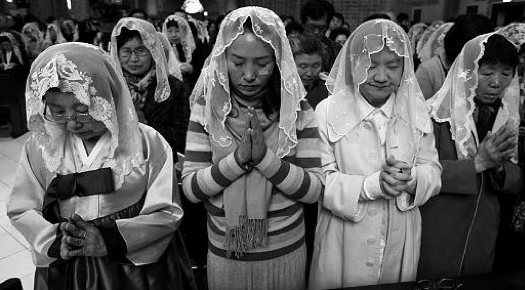
Korea - Religion in Korea encompasses a number of different traditions. The new religious census conducted in Korea showed some surprising statistics. For the first time, officially, there are more Koreans that consider themselves non-believers than those who say they are believers. "Christians were elated but scratched their heads, Buddhists were shocked and repented, while Catholics were calm yet deep in thought," a local report said of the census result.
Non-believers accounted for 56.1 percent of the population ― 27.5 million ― in the Statistics Korea 2015 Population and Housing Census. Statistics show that in 2005 the number of believers was 52.9% of the population but in the latest census the number was 43.9%.
 The figure for non-believers has jumped almost 10 percent from 10 years ago, according to the report. While respondents were mainly non-Catholic Christians, Buddhists and Catholics, Christians totaled 9.68 million (19.7 percent), topping the number of Buddhists ― 7.62 million (15.5 percent) for the first time. Buddhism in 2005 was 22.8% and in 2015 decreased to 15.5%. 9.7% of the population belongs to Protestantism which is an increase from 2005 where it was at 18.2%.
The figure for non-believers has jumped almost 10 percent from 10 years ago, according to the report. While respondents were mainly non-Catholic Christians, Buddhists and Catholics, Christians totaled 9.68 million (19.7 percent), topping the number of Buddhists ― 7.62 million (15.5 percent) for the first time. Buddhism in 2005 was 22.8% and in 2015 decreased to 15.5%. 9.7% of the population belongs to Protestantism which is an increase from 2005 where it was at 18.2%.
The method of making the census this time was different from the last and it was more accurate than the past according to a priest member of the Bishop's pastoral research center. It is not surprising that the numbers are lower than the registered Catholics in the country. Many of those baptized while in the military, he says, don't even remember being baptized and many don't even remember that they are Catholic but all these have parish registers and are counted as Catholics.
The overall Christians figure might have included believers not registered in orthodox institutions, or heretics, and those who consider themselves Christians but do not attend church ― also known as "Canaan Christians," according to some experts. A Christian forum on January 5 raised awareness of Canaan Christians, who are estimated to number about 1 million in Korea. The forum was told that the issue of Christians leaving churches or showing enmity towards their religious leaders should be considered seriously.
The indigenous religion of Korea and of the Korean people is Korean shamanism. Shamanism is very much part of the culture. On the other hand, Korea has a very small number of those who call themselves Confucian but the culture has been strongly influenced by Confucianism. So one may ask how accurate are the data obtained by some census because any census that attempts to determine the number of religious believers is always going to have problems.
Photo Credits: Asia News
